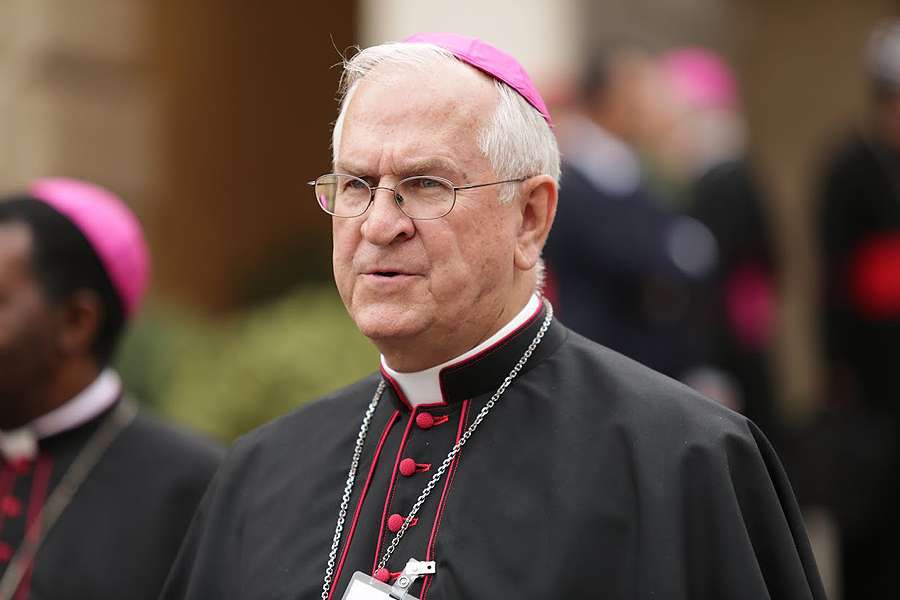Baltimore, Md., Nov 14, 2016 / 11:30 am (CNA/EWTN News).- Concrete outreach to those in need should be the focus of the U.S. bishops going forward, as well as “respectful dialogue” with the Trump administration, the bishops’ conference president said Monday.
“United with Pope Francis, we are confident and we are hopeful, as we hear once again the echo of the words of Jesus: what you did for one of my least, you did for me,” Archbishop Joseph Kurtz of Louisville told the U.S. bishops. Archbishop Kurtz is the outgoing president of the U.S. Conference of Catholic Bishops, finishing a three-year term. He spoke at their general assembly in Baltimore, Maryland Nov. 14. The bishops are entering their 100th year of holding plenary gatherings.
“Whether it is protecting the child in the womb and her mother or a family seeking a better life as they migrate from another country, it is our task to think not of our own interests but of the common good,” he said. “We embrace that task with enthusiasm and enter respectful dialogue with President Donald Trump and with both houses of Congress.”
He said this dialogue would seek “concrete actions.” “There’s been an unprecedented lack of civility and even rancor in the national elections just completed. Now we are required to move forward with respect for those in public office,” he said. “We seek the common good based on truth and charity, without imposing, but strongly proposing, as we have done for 99 years.”
The main focus of Archbishop Kurtz’s remarks was not the political elections, but the tasks facing the U.S. bishops today. “Jesus spoke and acted in very concrete ways. Empowered by His grace, so do we,” he told the bishops. He encouraged their outreach to pregnant mothers, to the dying, to the family “fleeing for a better life for their children,” and the inner city family “seeking opportunities and not racial profiling.”
He encouraged the bishops’ outreach to those who wish to serve others with “integrity of faith.” Bishops should work to build trust in their neighborhoods, he continued. He predicted they would find “signs of hope from unexpected places” in the future leaders born today and could draw hope from their encounters with others.
Archbishop Kurtz recounted his encounter with a refugee family in Ukraine, where he met a young eight-year-old refugee with Down Syndrome. “He instinctively jumped into my arms, gave me a big smile and said in a language that my heart understood: ‘I love you’,” the archbishop recounted. “The lesson is obvious: we bishops and all who serve the Lord need also to open our hearts to the joy that others will give to us. Joy and love are not only to be given but also to be received.”
For the archbishop, that boy was “a trusting child of God deserving a chance,” much like many American young people. In February, Archbishop Kurtz met with two dozen unaccompanied minors in El Paso before Pope Francis said Mass on the other side of the border. He asked them their dreams, and they said they wanted only to work, to study and to join their family. “Quickly I asked: ‘not also to pray?’ and without a pause they said ‘Yes, to pray to God to help’,” he recounted.
“Our nation is on thin ice when refugees are spoken of in the abstract,” Archbishop Kurtz said. “After I met the unaccompanied youth seeking reunion with their families, the issue became very clear. Surely the situations are complex but the voiceless remain anonymous unless there is a face to the voice.” He encouraged the bishops to find in such people these “flashes of inspiration and encouragement that come to us from God.”
The archbishop listed several challenges facing the bishops: threats to the global community, especially religious persecution, and challenges within the United States, related to the dignity of the human person. He also mentioned possible problems for American Catholics, citing “challenges to unity in truth and charity within our Church as we tirelessly announce the good news of Jesus Christ, to draw all to Christ and to walk with all toward conversion.”
Archbishop Kurtz recounted the encouragement he had received from his friend and mentor, the late Bishop emeritus David B Thompson of Charleston. He also encouraged the bishops to pay attention to one another and to remember that they are a “family, a ‘communio’ of pastors.” “Just as a family seeks to serve each other as a prerequisite for authentic service beyond, so we do too. If not, our pastoral hearts will be shallow and short lived with others,” he said.
He voiced gratitude to the bishops and the bishops’ conference staff Archbishop Kurtz closed with a reflection on his episcopal motto “Hope in the Lord.” “This is not a pie-in-the-sky hope but a hope grounded in the reality of God's grace in the midst of challenges,” he said.

